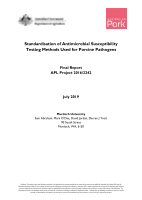Library & Resources
Library & Resources
Complete Research Reports
Item Details

Standardisation of antimicrobial susceptibility testing methods used for porcine pathogens
14 Pages
Author(s): Darren J Trott, David Jordan, Sam Abraham, Mark O'Dea
One of the key steps in controlling and managing bacterial infections in animals is by accurate identification and antimicrobial susceptibility testing of the disease-causing pathogens. In Australia, veterinary diagnostic laboratories that service the pig industry utilise different methods for culture, identification and antimicrobial susceptibility testing of porcine bacterial pathogens. Standardisation of these methods will allow for benchmarking of antimicrobial resistance and facilitate the reduction of antimicrobial resistance in the pig industry.
Benefits to industry:
- Standardisation of antimicrobial resistance testing will also allow for evaluating the success of intervention strategies used by the pig industry to reduce antimicrobial resistance.
- Standardised methods may allow for decreased test cost via the potential for automation, and the ability for bulk purchase of reagents across the diagnostic network.
Key findings:
- The key recommendation arising from this project is that all veterinary diagnostic laboratories that service the Australian pig industry adhere to the protocols recommended in this report for bacterial isolation and antimicrobial susceptibility testing for obtaining consistent laboratory diagnoses and antimicrobial susceptibility data.
- Overall the project has led to some significant outcomes, however for long term success there is a need for on-going dialogue and collaboration with both veterinarians and veterinary diagnostic laboratories that service the pig industry.
Download



